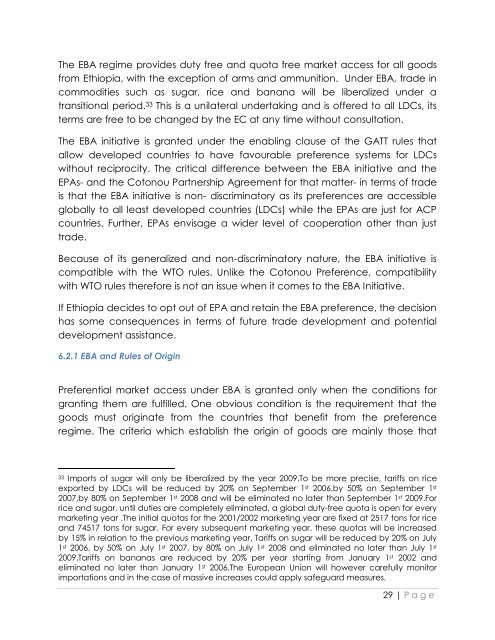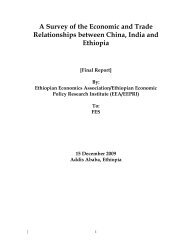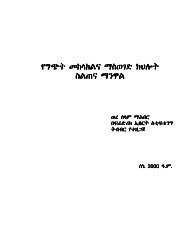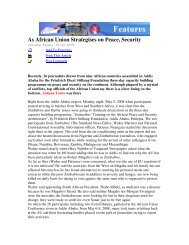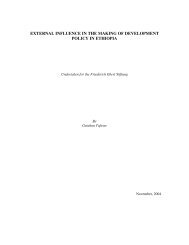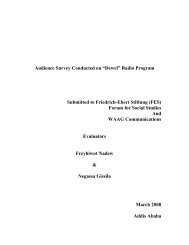Ethiopia and EPA Negotiation 2008 - FES Ethiopia
Ethiopia and EPA Negotiation 2008 - FES Ethiopia
Ethiopia and EPA Negotiation 2008 - FES Ethiopia
You also want an ePaper? Increase the reach of your titles
YUMPU automatically turns print PDFs into web optimized ePapers that Google loves.
The EBA regime provides duty free <strong>and</strong> quota free market access for all goods<br />
from <strong>Ethiopia</strong>, with the exception of arms <strong>and</strong> ammunition. Under EBA, trade in<br />
commodities such as sugar, rice <strong>and</strong> banana will be liberalized under a<br />
transitional period. 33 This is a unilateral undertaking <strong>and</strong> is offered to all LDCs, its<br />
terms are free to be changed by the EC at any time without consultation.<br />
The EBA initiative is granted under the enabling clause of the GATT rules that<br />
allow developed countries to have favourable preference systems for LDCs<br />
without reciprocity. The critical difference between the EBA initiative <strong>and</strong> the<br />
<strong>EPA</strong>s- <strong>and</strong> the Cotonou Partnership Agreement for that matter- in terms of trade<br />
is that the EBA initiative is non- discriminatory as its preferences are accessible<br />
globally to all least developed countries (LDCs) while the <strong>EPA</strong>s are just for ACP<br />
countries. Further, <strong>EPA</strong>s envisage a wider level of cooperation other than just<br />
trade.<br />
Because of its generalized <strong>and</strong> non-discriminatory nature, the EBA initiative is<br />
compatible with the WTO rules. Unlike the Cotonou Preference, compatibility<br />
with WTO rules therefore is not an issue when it comes to the EBA Initiative.<br />
If <strong>Ethiopia</strong> decides to opt out of <strong>EPA</strong> <strong>and</strong> retain the EBA preference, the decision<br />
has some consequences in terms of future trade development <strong>and</strong> potential<br />
development assistance.<br />
6.2.1 EBA <strong>and</strong> Rules of Origin<br />
Preferential market access under EBA is granted only when the conditions for<br />
granting them are fulfilled. One obvious condition is the requirement that the<br />
goods must originate from the countries that benefit from the preference<br />
regime. The criteria which establish the origin of goods are mainly those that<br />
33 Imports of sugar will only be liberalized by the year 2009.To be more precise, tariffs on rice<br />
exported by LDCs will be reduced by 20% on September 1 st 2006,by 50% on September 1 st<br />
2007,by 80% on September 1 st <strong>2008</strong> <strong>and</strong> will be eliminated no later than September 1 st 2009.For<br />
rice <strong>and</strong> sugar, until duties are completely eliminated, a global duty-free quota is open for every<br />
marketing year .The initial quotas for the 2001/2002 marketing year are fixed at 2517 tons for rice<br />
<strong>and</strong> 74517 tons for sugar. For every subsequent marketing year, these quotas will be increased<br />
by 15% in relation to the previous marketing year. Tariffs on sugar will be reduced by 20% on July<br />
1 st 2006, by 50% on July 1 st 2007, by 80% on July 1 st <strong>2008</strong> <strong>and</strong> eliminated no later than July 1 st<br />
2009.Tariffs on bananas are reduced by 20% per year starting from January 1 st 2002 <strong>and</strong><br />
eliminated no later than January 1 st 2006.The European Union will however carefully monitor<br />
importations <strong>and</strong> in the case of massive increases could apply safeguard measures.<br />
29 | P a g e


